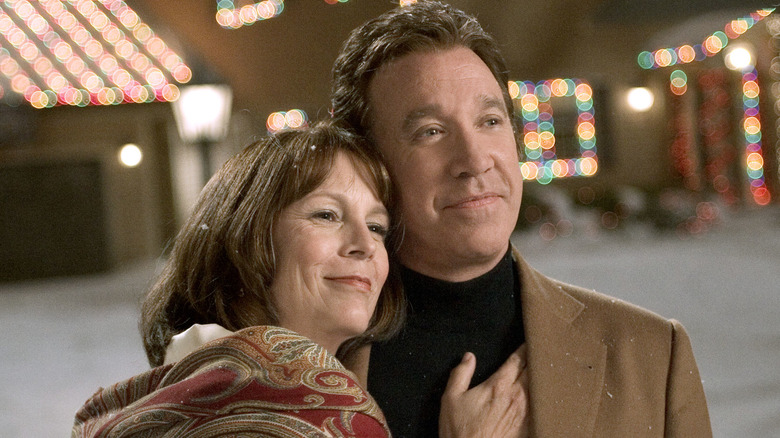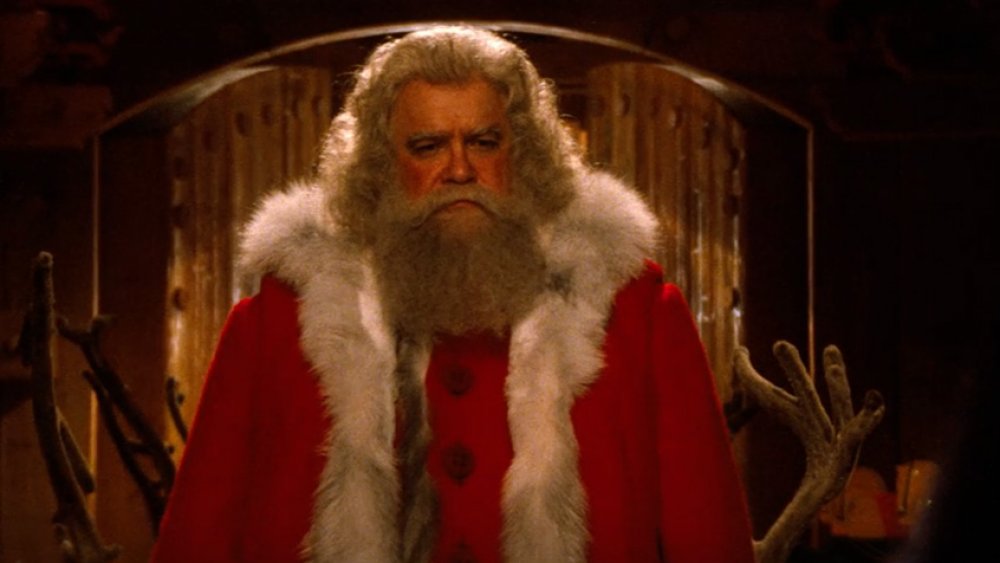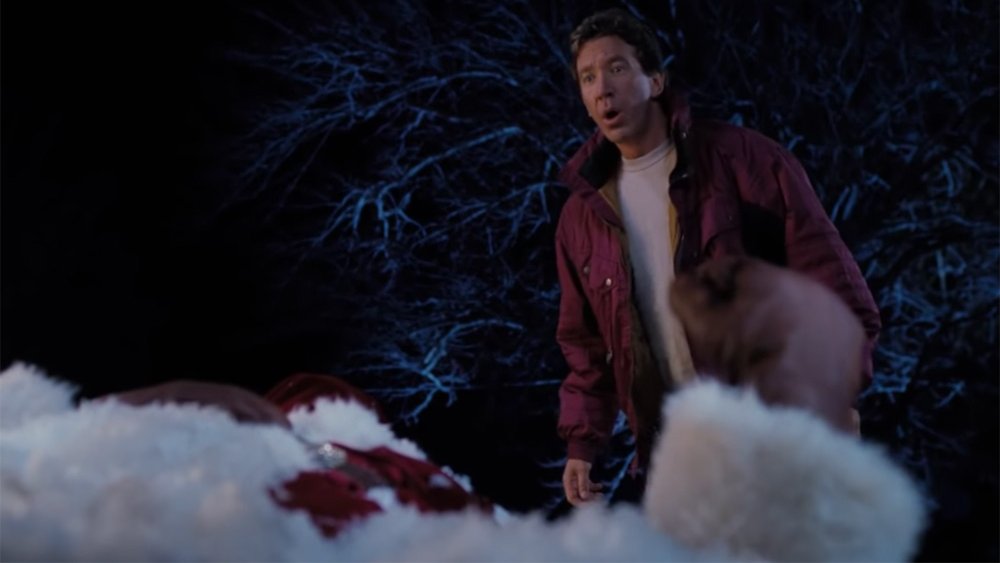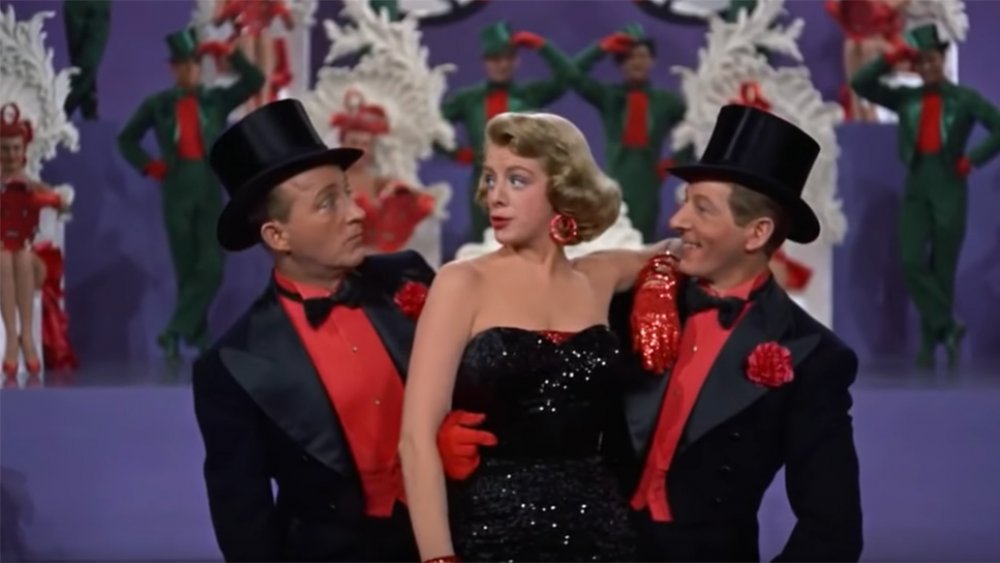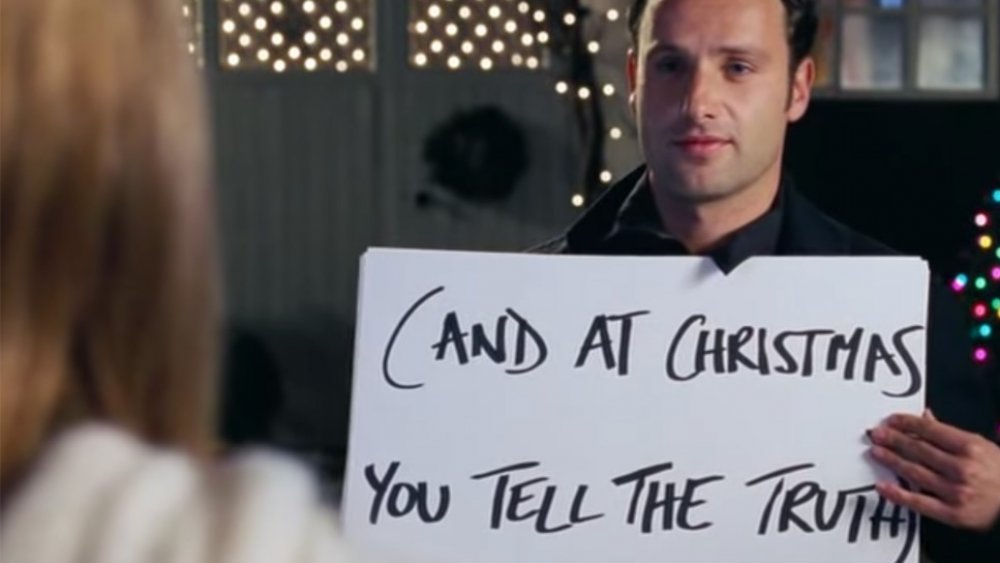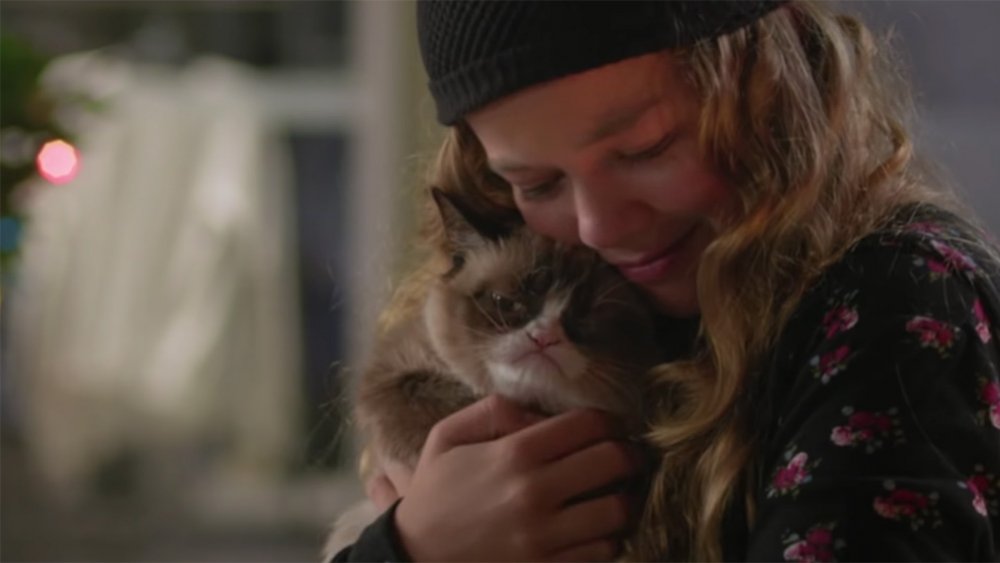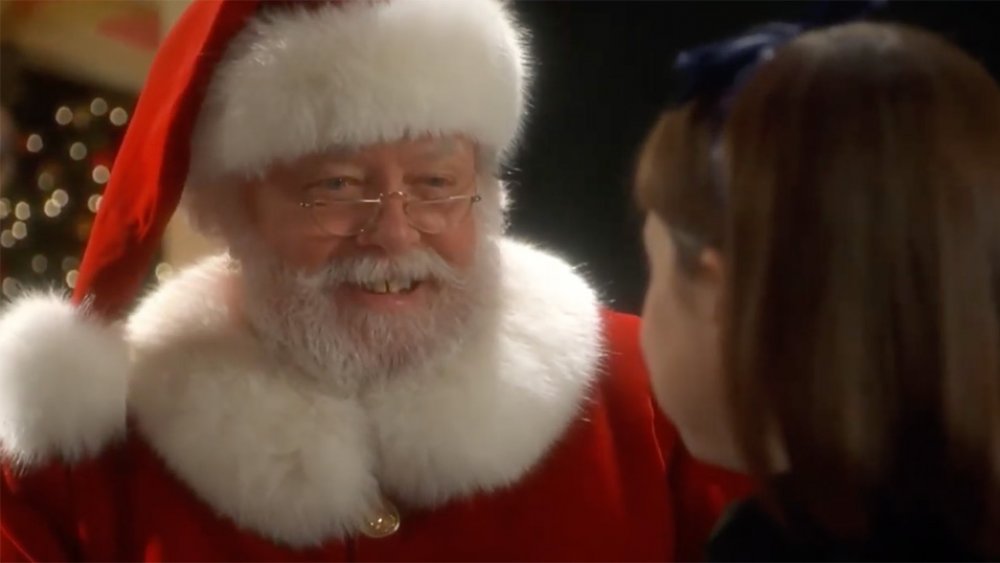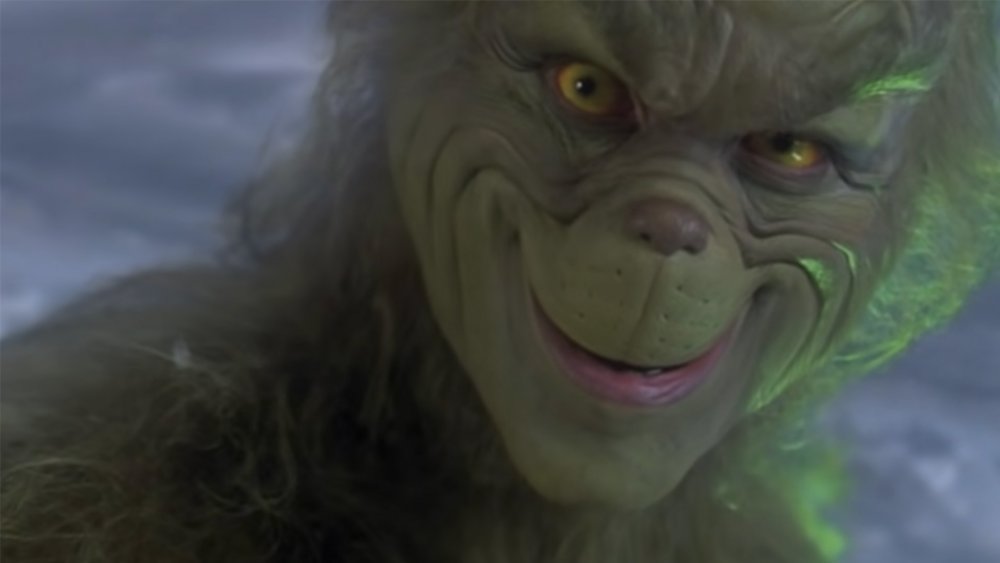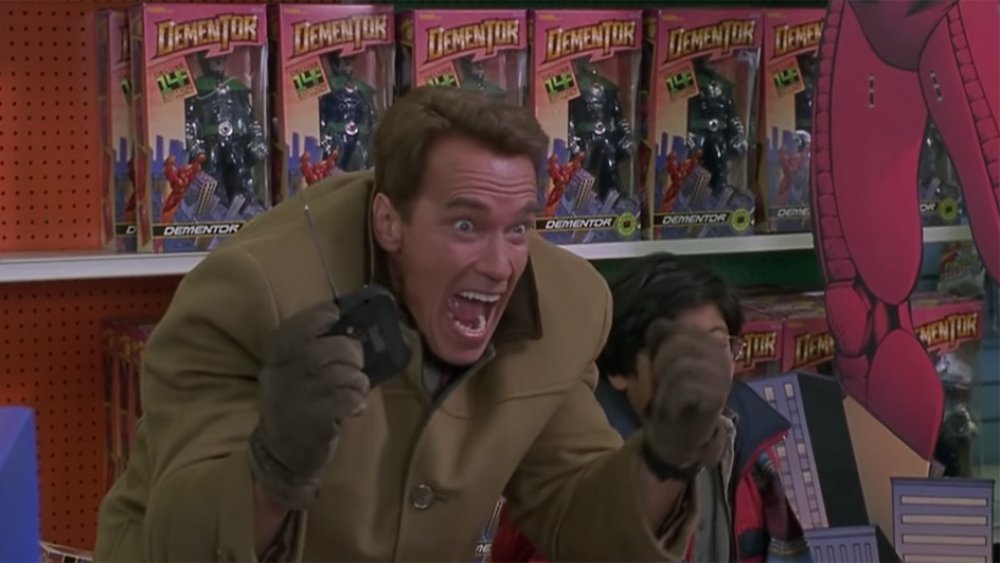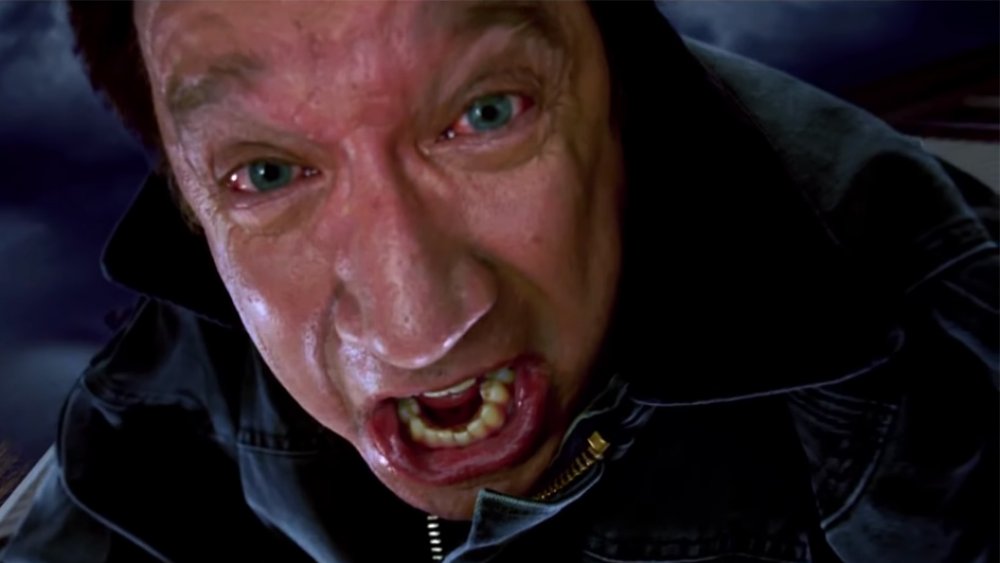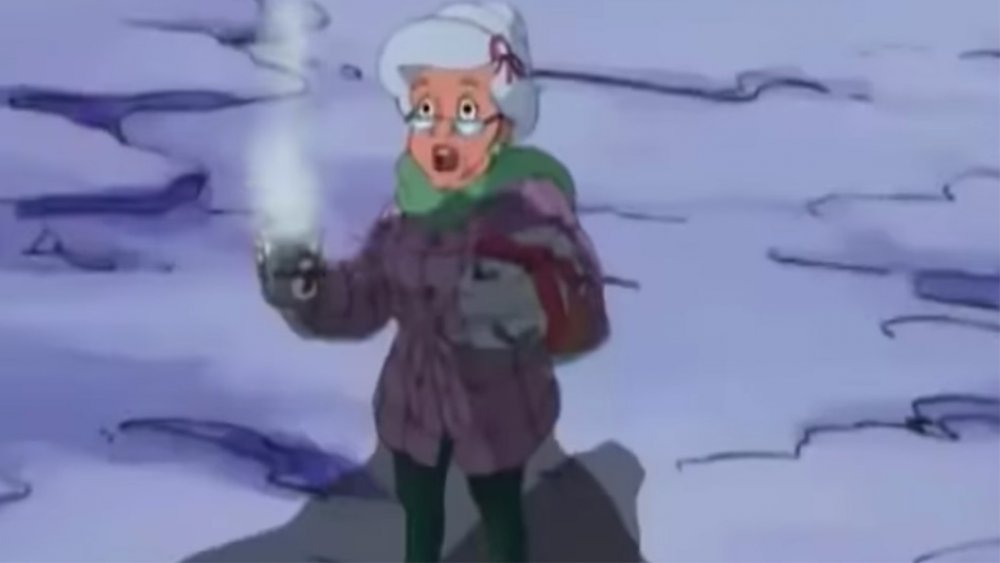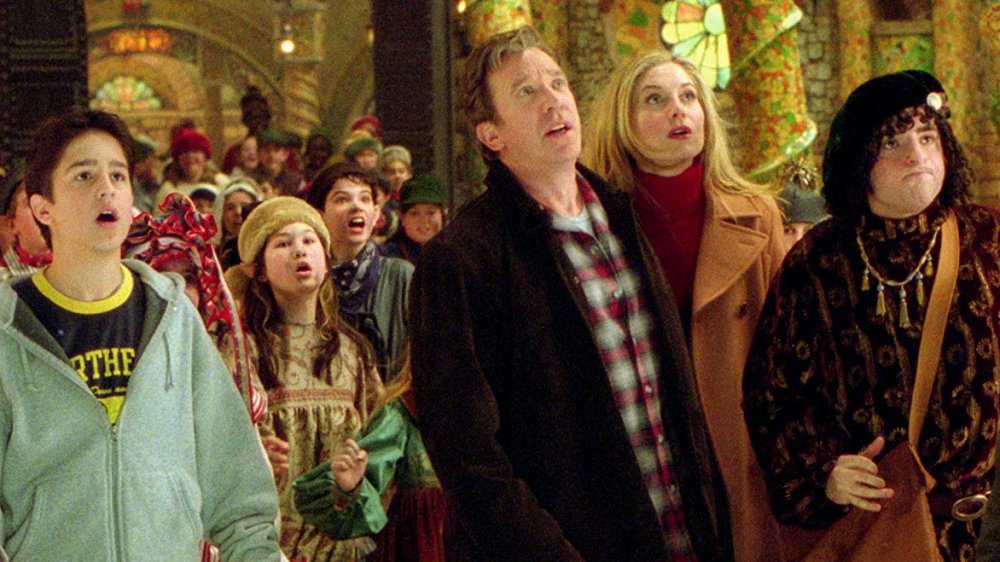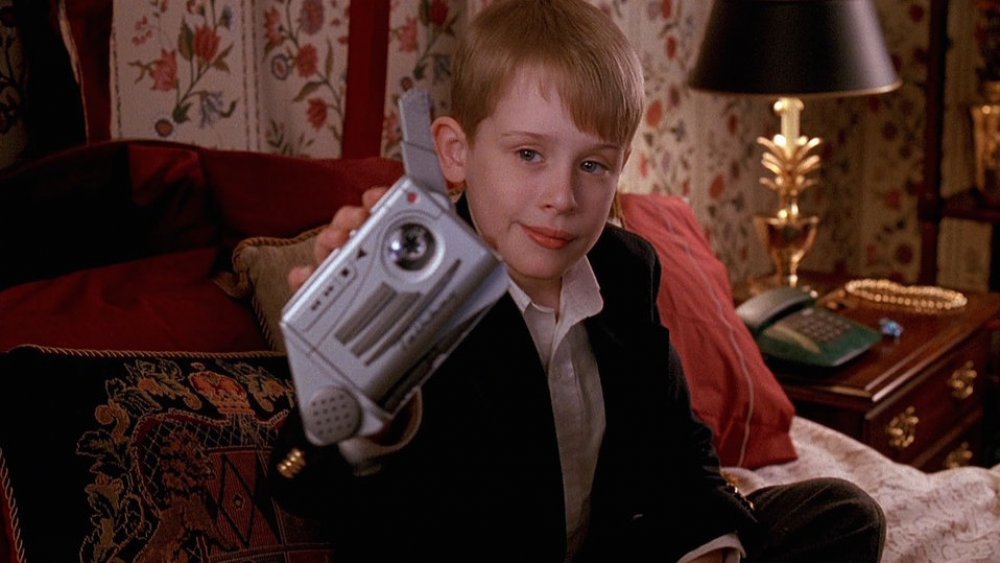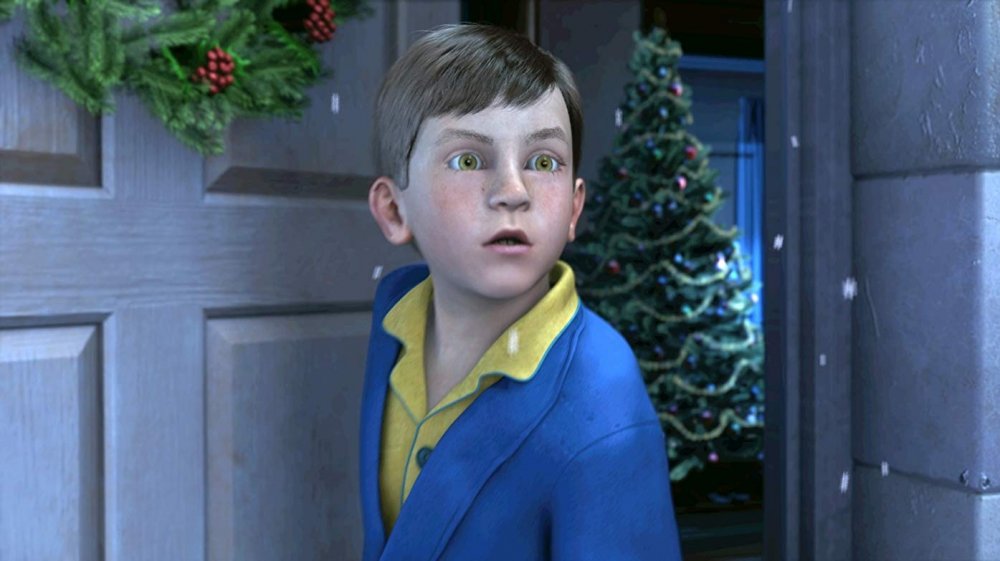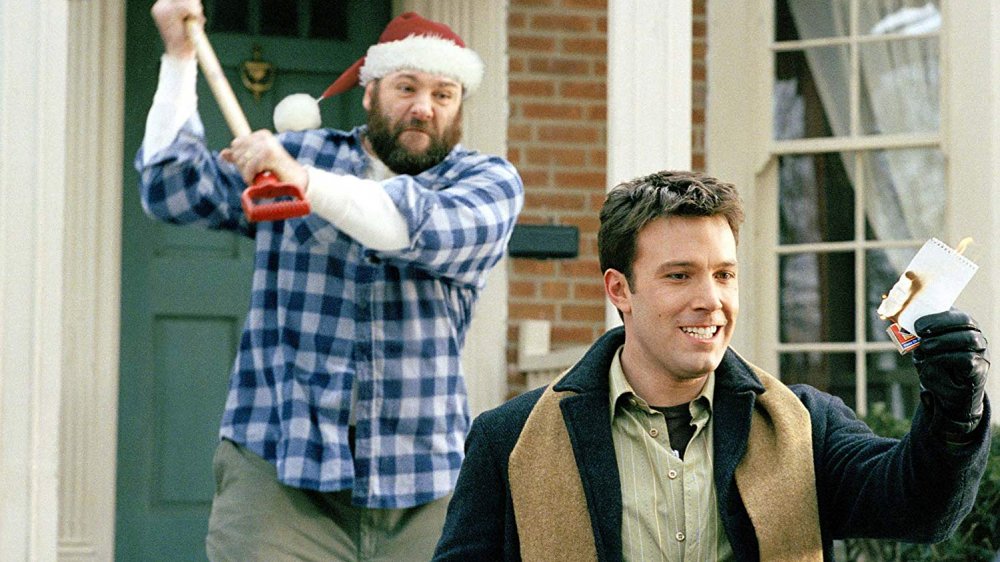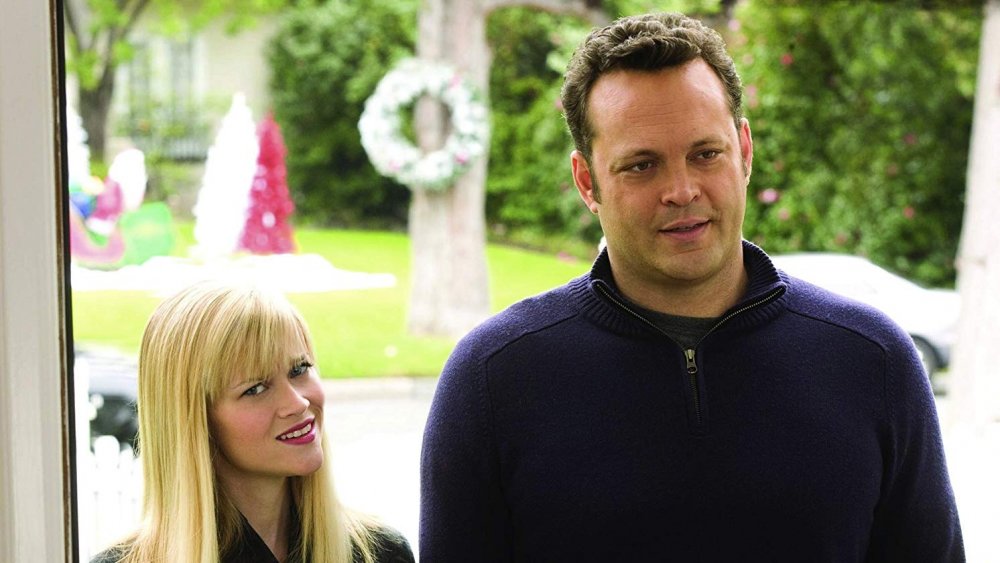Christmas Movies That Have Aged Terribly
While Halloween has its share of horror movies and Valentine's Day is always accompanied by a rom-com or two, Christmas blows the competition out of the water when it comes to movies tied to specific holidays. It's a genre unto itself — between made-for-TV specials, streaming originals, and the annual slew of big-screen heartwarmers, there are dozens of Christmas movies every year. Some of them are even pretty good and wind up becoming traditions in their own right, something to watch over a cup of hot chocolate while you're decorating the tree.
But while some Christmas classics get better every time you watch them and bring their own little brand of holly jolly nostalgia, there are others that just don't hold up. These are the ones with the flaws that only get magnified over time, from dubious messages and weird ideas about what kids like about Santa to some truly regrettable choices in subject matter. Here's a not-so-fond look back at some Christmas movies that have aged terribly.
Santa Claus: The Movie (1985)
After the success of the Superman franchise that they'd helped to launch in 1978, producers Alexander and Ilya Salkind decided to take a shot at another beloved hero who flies around the world doing good deeds. The result was 1985's Santa Claus: The Movie, and to say that it's not as good as Superman is sort of like saying that getting hit in the face with a shovel isn't as fun as eating a Big Mac. The latter might have its flaws, but it's still enjoyable. The former should be avoided at all costs.
There are a lot of problems with Santa Claus, but one of the biggest comes right up front when, for some reason, the movie opens with Santa Claus and his wife freezing to death. He then ascends out of his frozen corpse to the North Pole toy shop, where the elves have already spent countless years building toys and just putting them into a warehouse like the Ark of the Covenant at the end of Raiders. Apparently they're just waiting for someone to show up and die so the guy who played the Penguin on the Batman TV show can hire him as a sort of mystical delivery driver. That's Santa Claus' origin story. He dies, and then his soul is condemned to roam the world dropping off toys for eternity. Merry Christmas, everybody!
Still, as weird as that origin story is, it's no stranger than the idea of a fourth-century Turkish bishop getting the job because he once resurrected a trio of dismembered kids and became the Patron Saint of Children. The real problem is that Santa Claus: The Movie is not actually a movie about Santa Claus. David Huddleston, who plays the jolly old saint, is billed third behind Dudley Moore and John Lithgow. Once that origin's done, they're the ones who actually star in the story, as an elf named Patch and a pinstriped '80s businessman who wants to create a new Christmas to maximize profits. Santa dying and corporate market strategies — that's what kids like about Christmas, right?
The Santa Clause (1994)
Since its release in 1994, The Santa Clause has become a holiday staple, and it's easy to see why. Former cocaine dealer Tim Allen stars as Scott Calvin, a businessman who accidentally kills Santa Claus and then has to take over for him when he finds himself wrapped up in every child's favorite thing, the magical, whimsical world of contract law.
Not only is this another movie that opens with Santa Claus dying — something that a lot of movie executives seem to think kids really want to see — it adds a whole layer of legal wrangling that, in retrospect, seems downright demonic. This is a movie based around the idea that the identity of Santa Claus is passed down through the generations when someone murders (or in Scott's case, manslaughters) the existing Santa. If that wasn't enough, fulfilling the role of Santa is an irresistible magical compulsion that requires you to completely abandon your life in order to serve at the bidding of this endless legacy of death and contractual obligations.
There's even a body horror element to it, where becoming Santa robs you even of your own physical autonomy, twisting you into the form it has chosen. It gets even worse in the sequels: You find out that the magical contract also comes with a forced marriage, and that you have to defend your right to be Santa against challengers who want your power for their own which — and this cannot be stressed enough — they could always get just by killing you and putting on your jacket. The Santa Clause is a movie in which just being a cheerful gift-giver is a curse.
White Christmas (1954)
White Christmas is a classic. It's got everything: comedy, romance, lavish musical numbers, a story about the bonds forged between friends during wartime and what they mean once everyone goes home and tries to return to a peaceful life that's guaranteed to bring a tear to the eyes of even the grinchiest viewer, and a soundtrack that includes the best-selling single in the history of music. And, you know, it also has that minstrel show number, which probably seemed like a better idea back in 1954.
In fact, that particular section of the movie, when the cast sings "Abraham," talks about how great minstrel shows are, and mixes in a few old timey jokes featuring Mr. Bones and Mr. Interlocutor — the Jay and Silent Bob of minstrelsy — is often cut out of TV broadcasts. There's a good reason for that, too. Unlike, say, "Choreography," a genuinely funny lament about how all these dancers today are just so darn serious, "Abraham" yearns for the past through the visual iconography of Jim Crow-era "entertainment," right down to the background dancers wearing costumes meant to look like watermelons. Once you notice that, it's the only thing you'll see.
The only saving grace of the number is that Bing Crosby, Danny Kaye, and Rosemary Clooney aren't performing in blackface. That's a pretty low bar to clear, but it's one they've failed to get over before — White Christmas is a kinda-sorta remake of 1942's Holiday Inn, the movie that introduced the song "White Christmas" to the world. That movie also includes the minstrel number, and in that version, Bing and the entire cast do full-on blackface makeup in a scene that's downright jaw-dropping. This Christmas, maybe just skip to the next number. We promise you won't miss it.
Love Actually (2003)
In case you've missed out on the ongoing discourse about Love Actually, the short version is that by juggling nine different plots, it becomes a sort of Christmasy chimera that whiplashes its viewers back and forth between stories with very different tones. Weirdly enough, the best are probably the ones that skew pretty far from traditional Christmas themes. There's John and Judy (Martin Freeman and Joanna Page), who fall for each other while working as stand-ins for a movie's intimate scene, chatting casually while robotically dry-humping in their birthday suits while production assistants try to get the lighting right; David and Natalie (Hugh Grant and Martine McCutcheon), a new Prime Minster who nearly causes an international incident when he falls for a newly hired member of his staff; and Daniel and Sam (Liam Neeson and Thomas Sangster), a grieving father who encourages his son to learn drums to impress a classmate, who would herself go on to be the voice of Marceline the Vampire Queen.
And then there are the other plots. Billy Mack learning about True Friendship could've been cliché, but ends up being genuinely emotional. Harry and Karen's story of office infidelity is uniquely heartbreaking. Colin's trip to America is... well, not exactly sweet, but probably as charming as a story about having an orgy in a Christmas movie could possibly be. The real trouble comes from what is likely meant to to be the movie's most romantic storyline: Juliet, Peter, and Mark.
The idea of Mark (played by Andrew Lincoln, who would go on to bring a similar vibe of on-the-edge desperation to his role as Rick on The Walking Dead) confessing his feelings and promising to love Juliet (Keira Knightley) from afar probably seemed like it would come off as romantically chivalrous. The further away we get from the film, though, the more the idea of this handsome incel pining over his best friend's wife and arranging a secret, stalkerish confession that involves a photograph of a dead body seems creepy as hell. And that's before you get to the weird, smiling betrayal of Peter (Chiwetel Ejiofor, who deserves better) placing his implicit trust in a "best friend" who can't even shoot a wedding video without turning it into a series of creepshots.
Grumpy Cat's Worst Christmas Ever (2014)
Basing a movie on a meme is never going to result in something that stands the test of time, but then again, it's not really meant to. It's the very definition of a quick cash grab, with a script about a generic true meaning of Christmas that's probably knocked out in an afternoon and a shooting schedule that's meant to grind it out as fast as possible so the crew can move on to the next Lifetime Original.
With all that said, it probably won't surprise you to learn that Grumpy Cat's Worst Christmas Ever, starring the feline viral sensation/marketing juggernaut properly named — sigh — "Tardar Sauce," was not well-reviewed on its release. Still, it's worth noting for a couple reasons that go well beyond the usual problems that go along with trying to cash in on a viral trend.
For one thing, there's nothing that's going to seem less funny or charming than the thing that everyone was into a couple years ago. The other, and far more depressing thing, is that Grumpy Cat died in May of 2019, putting a quite literal expiration date on how much fun this movie would ever be to revisit. Merry Christmas, kids! Here's that dead cat you used to like!
Miracle on 34th Street (1994)
The original Miracle on 34th Street has been in the Christmas Movie Hall of Fame since its release, right up there with A Christmas Story and It's a Wonderful Life. The story's message of belief in the best of people, undoubtedly inspired by the "Yes, Virginia, There Is a Santa Claus" letter, is still resonant today, and Edmund Gwenn set the standard for playing Santa Claus that's rarely been equaled since. It even has an ending so cleverly constructed that it still holds up over 70 years later.
The 1994 remake is... fine. It's not bad by any means; Richard Attenborough makes a fantastic Santa, and Mara Wilson is legitimately in the running for the best child actor of all time, so at the very least, it has that going for it. It's perfectly charming in its own right, but it's a pretty direct remake, so once the novelty of having a "new" version of the story wears off, there's really no reason to go back to it in favor of the 1947 version. When Macy's, which had literally filed for bankruptcy two years earlier, turns down the opportunity for a movie-length advertisement because they feel like the original "could not be improved upon," you know you're probably on the wrong track.
There is one change, but in this case, it actually makes the movie worse. Unlike the original resolution of having the post office deliver letters to Kris Kringle, thereby taking his identity out of the court's jurisdiction and allowing the trial to believably end without having the judge confirm or deny the existence of Santa Claus, the remake takes a different path. This time, the judge is inspired by the words "In God We Trust" on a dollar bill, and rules that faith and belief are core values of the United States of America, and therefore this guy might be Santa, which is Pascal's Wager applied to Santa Claus. Again, it's fine, but it's also the kind of awkward, quasi-religious reasoning that you'd expect to be delivered by a smarmy Kirk Cameron.
How the Grinch Stole Christmas (2000)
While we're on the subject of unnecessary remakes of holiday classics, it's worth noting that Jim Carrey's live-action version of How the Grinch Stole Christmas was wildly successful when it was released in 2000. Despite mixed reviews, it held the record for a Christmas movie's best opening weekend for 18 years, until it was finally dethroned by — wait for it — The Grinch, the re-remake starring Benedict Cumberbatch's attempt at an American accent.
Unfortunately, Grinch 2000 — and it's a small miracle that this was not the actual title of the film — achieved that success by embracing two of the 21st century's most annoying film trends. The first, obviously, was remaking a beloved animated classic as a lavish live-action spectacular, a trend that continues today with Disney's attempt to remonetize their entire animated back catalog. The second was to give a villainous character a tragic backstory in order to justify their villainy and help pad out the transition from a 26-minute animated special to a movie that edges up on two full hours. That kind of attempted pathos is usually pretty unnecessary, but in the Grinch's case, it contradicts the text. The Grinch hates the whole Christmas season, and no one quite knows the reason. It's right there in the song.
That's not to say that HTGSC2K isn't bad on its own merits. Your enjoyment of Carrey's performance depends entirely on your tolerance for his over-the-top slapstick style, which was already getting stale by 2000 and hasn't gotten any better in the years since. Also, 20 years of exposure to the internet makes it a lot easier to recognize one of the movie's more adult jokes. During the Grinch's origin, he's left outside overnight as a baby, crying in the snow while the Whos down in Whoville have a key party. If you're the person who always wanted Dr. Seuss' charming tales to have more group 'fun,' good news. For the rest of us, this one's better off skipped.
Jingle All the Way (1996)
Saying that Jingle All the Way hasn't aged well might imply that it was actually well-received at the time, but that's not really the case. It was heavily panned by critics, owing to its wildly uneven tone and a weird mixture of cynical satire and cartoonish slapstick. Still, while some Christmas oddities become cult favorites — Santa Claus Conquers the Martians rules, actually, especially if you watch it with friends — the years have not been kind to Jingle All the Way.
The first big blow to the movie's reputation came immediately after its release. The entire plot of the film revolves around Howard Langston, a suburban dad and mattress salesman who is suspiciously built like an Austrian bodybuilder, trying to get his hands on the year's hottest toy: an action figure of Turbo Man, every child's favorite superhero! Since the film was released the same year that fistfights were breaking out over Tickle Me Elmo dolls, it seems like this would be a subject that was perfectly suited for satire. The problem was that 20th Century Fox actually released a Turbo Man doll that retailed for $25, rushed into production while the movie was being filmed, and released it alongside an 89-minute movie about how much everyone wanted a Turbo-Man doll.
Beyond the doll, though, the movie's jokes just don't land — and these days, the use of a bomb threat for comedy goes over about as well as you'd expect.
Christmas With the Kranks (2004)
At first glance, the premise of Christmas With the Kranks seems like it could make for a perfectly acceptable way to spend two hours of your holiday season. A couple of empty nesters that usually go all out for their Christmas celebrations decide to tone things down, skipping out on decorating and putting up a big tree in favor of treating themselves to a vacation. The other people in the neighborhood, who have gotten used to the Kranks' extravagant decorating and spending habits, are all thrown off and mystified by this.
So far, so good. The problem comes when the rest of the neighborhood, instead of learning a lesson about how you don't need a bunch of expensive lights and presents to have a good Christmas, decides to pressure and/or shun the Kranks in response. The Kranks are ostracized by their community, and Christmas carolers stand on their lawn singing at them to get them to give in — which, incidentally, is the same technique that the Navy SEALs employed against the Vatican's embassy in Panama when they were trying to apprehend Manuel Noriega in 1989.
The worst part is that by the movie's logic, the neighborhood is right. The climax of the movie comes when the Kranks have to cancel their plans and decorate their house in a hurry, and everyone comes together to make them conform after a few weeks of psychological warfare. The idea of a movie that stressed conformity at all costs in order to please others and maintain peace and stability might've made sense to someone in 2004, but these days, it's a pretty weird message. That part about how you're not really celebrating Christmas unless you're spending a ton of money on performative displays that other people are demanding isn't that great, either.
Grandma Got Run Over By A Reindeer (2000)
Before we go any further, we need to settle one thing: we all agree that "Grandma Got Run Over By a Reindeer," the inescapable novelty song, is about a murder, right? Like, we all know that Grandpa definitely killed Grandma on Christmas Eve because he's been having an affair with Cousin Mel and the entire family has decided to cover it up by telling the children that she must've been an unwitting victim of Santa Claus? Okay, good, we're all on the same page.
With that in mind, the very idea of adapting Elmo & Patsy's only hit single into an animated Christmas special for the whole family is ludicrous, but the way that Phil Roman decided to go about it was even weirder than you expect. In an attempt to include every piece of plot hinted at in the song — including the murder part — it's reimagined as every kid's favorite kind of story. That's right, everyone: it's about corporate takeovers and lucrative franchising opportunities!
The animated version categorizes Grandma as the owner of a general store who is betrayed by Cousin Mel, who wants to sell the shop for a profit to a larger corporation. Grandma then gets literally run over by Santa Claus and gets amnesia, and is missing for nine months while she's recuperating at the North Pole because Santa Claus, who makes a list, checks it twice, sees you when you're sleeping, etc., has no idea who she is. Eventually Santa gets arrested for kidnapping, but it turns out Mel poisoned Grandma's fruitcake, and the corporation winds up working with Grandma to franchise her stores. For the kids!
We could probably deal with Santa being brought to trial for a federal crime, but a massive corporation turning out to actually be good is a little bit too far for these days.
The Santa Clause 2
It took eight years for a Santa Clause sequel to finally materialize, and when it did the plot once again hinged on... well, contract stipulations.
For those of you who don't remember, The Santa Clause is a film about a guy who accidentally kills Santa Claus and then puts on his suit, thereby fulfilling a contract written microscopically on Santa's business card that says whoever puts on the suit is the next Santa. In The Santa Clause 2, Scott Calvin (Tim Allen) has come to terms with this agreement and is living happily as Santa, but then realizes he's losing weight and feeling less jolly lately. His elves then inform him that it's happening because of another, even tinier bit of text on that card which says that Santa must have a Mrs. Claus or he can't inhabit the role anymore.
This means that Scott has to return to Earth and spend a matter of weeks trying to find a woman to marry him, which he does through no small amount of magical manipulation. The film doesn't look as good now for a couple of reasons. One: The speed with which Santa's courtship has to move creates an inherent sense of creepiness. And two: The film presents marriage as an absolute necessity to complete even Santa's family unit. At a time when more and more people are questioning the traditional paradigms of family, it feels both old-fashioned and forced. No one, especially Santa, has to be married in order to be made whole.
Home Alone 2: Lost in New York
In Home Alone, Kevin McCallister is simply left... well, home alone. His parents rush out and forget that he's sleeping upstairs.
In Home Alone 2, Kevin accidentally boards a flight heading in the opposite direction of his parents, leaving him in New York while they're in Florida. Watching the sequel now, with a 21st century adult's view of what it's like to go through an airport, this becomes a good deal harder to believe. Kevin's family checks in at the curb when they get to the airport, then rush through the place to get to their gate, never once slowed down by a long TSA line or even a pre-check line. Kevin gets separated, and follows a guy who looks like his Dad from the back to the wrong gate. That part works, but then Kevin runs into an airline employee and knocks his boarding pass into the air while begging to be let on the plane his "Dad" just boarded. Another airline employee then just takes Kevin's word that his boarding pass is in the pile, and they put him on the plane. Rather than going to directly talk to "Dad," Kevin just grabs an empty seat, then puts on headphones to drown out any chance of him learning he's on the wrong plane.
Basically, it was much easier to just hop on a flight in 1992, and that makes Home Alone 2 a bit less believable now.
The Polar Express
Since its release in 2004, The Polar Express has remained a constant fixture of the holiday season for many families. It plays on cable frequently every December, and kids and adults alike watch it again and again. The film tells the story of a boy who seems to be losing his belief in Santa Claus who is invited to board a magical train bound for the North Pole on Christmas Eve. It's a simple but sweet tale, it's got lots of Christmas fun in it, and the train conductor is voiced by none other than Tom Hanks. What's not to love?
For some people, there's nothing to dislike about this, even all these years after The Polar Express was released. That's important to acknowledge, but for the rest of us, there's something about this film that seems a little more off with each passing year. Christmas joy or no Christmas joy, the movie just looks creepy.
The Polar Express was directed by Robert Zemeckis, and was the first film made entirely with digital motion capture technology, something that has come a long way since 2004. Mo-cap animation in 2004 does not have the same timeless quality that hand-drawn animation does, and so to our eyes now this film looks full of dead-eyed, waxy figures that look less human with each passing year. More than even some Christmas films that are much, much older, The Polar Express feels very much like the product of its time.
Surviving Christmas
It's important to accept that most Christmas movies take place in a kind of heightened reality that makes people do somewhat over-the-top things for the sake of the holiday season. If you accept that, you'll have a much easier time digesting many Christmas movies, but there are some that still strain our ability to play along. Surviving Christmas is one of those movies, and it just gets worse with time.
The film follows an advertising executive who, desperate to connect with someone for Christmas, goes to his childhood home and pays the family living there a vast sum of money to pretend to be his family for the holidays. They agree, and mayhem ensues.
There are a lot of little twists and turns in the resulting story, but it all boils down to this: Drew, the protagonist, had a rough childhood that he doesn't like to talk about, and he'd rather cover it up with money than really confront it. He covers it up with so much money, in fact, that he even pays the family extra to host a dinner for his girlfriend in which they pretend to be his relatives. The whole point of this is that he learns an important lesson about family at the end, but the point also seems to be "If you have unlimited money, you can do whatever you want." At a time when things like income inequality and economic strife are frequently discussed, it's not a message that plays well.
Four Christmases
Four Christmases is about a couple, Brad and Kate, who take a trip together every Christmas season and lie about where they're going so they won't get roped into any family holiday events. This year, their flight is cancelled, and they're caught on local news cameras at the airport. As a result, they get guilted into attending four different family Christmas events in a single day.
That's the framework of the story, but the real meat of it is the couple's stance on marriage and children. At the beginning of the film, Brad and Kate are so anti-family that they happily lecture near-total strangers about it. As they go through the Christmas gantlet, though, both come around in their own way to realizing that they actually do want children. Then they go back to lying to their families about having a kid at all, because that's healthy.
We live in a time in which people are discussing non-traditional families and paths through adulthood more than ever. People very often consciously, happily choose not to have kids while not being jerks about it, and it's not like a little Christmas magic is going to turn them around on that. There's nothing wrong with Brad and Kate changing their minds, but their whole somewhat cynical journey doesn't exactly get better with age.
